Hair Loss After Surgery – Causes And Prevention Tips
Because understanding the reasons behind your hair loss is crucial to managing the issue.
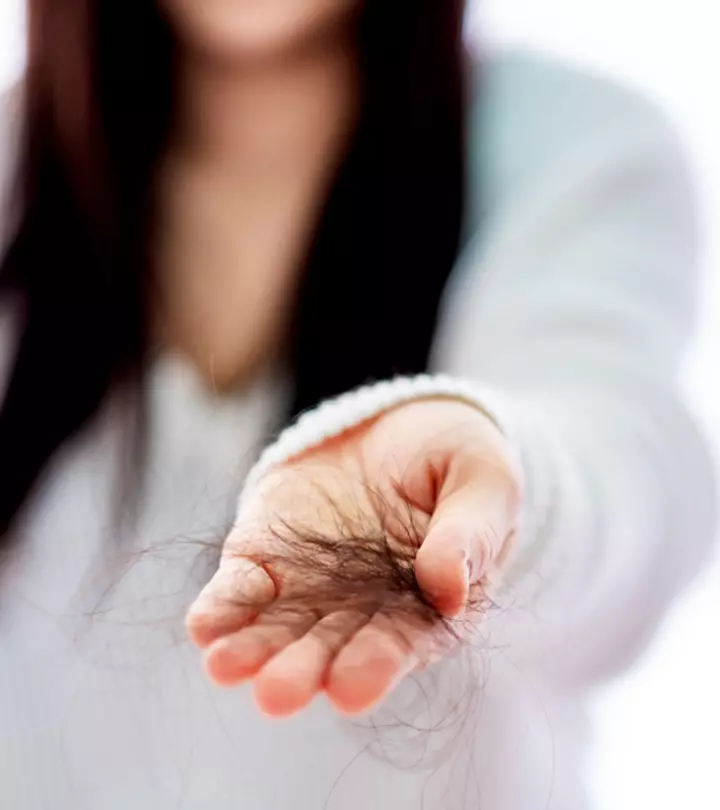
Image: Shutterstock
Science says that you experience more hair loss after surgery. Noticing large amounts of hair shedding might cause you to fret, but there is nothing to panic about. Losing hair after surgery is a normal but common side effect called telogen effluvium. This is your body’s way of coping with undergoing a medical operation, and your hair should start growing back within a few months.
Surgeries can be traumatic to the body. They may stress you out and cause hair loss. Here, we discuss all the causes of post-surgical hair loss and if it can be reversed. Keep reading.
In This Article
Hair Loss After Surgery: Is There Any Link?
Yes, surgery can cause temporary hair loss or telogen effluvium.
After a major surgery, the body experiences tremendous stress. This may interfere with the hair growth cycle and cause hair loss or thinning (1).
Hair loss is often common in people who have undergone bariatric or gastric sleeve gastric sleeve surgeryi A surgical procedure where part of the stomach is removed from the body while the remaining portion is formed into a tube-like structure. (2). Stress and nutritional deficiencies are believed to be the major reasons for such hair loss. Once these factors are addressed, hair loss stops (1).
The hair cycle is a complex biological process where the hair follicles undergo three major stages (1):
- Anagen (growth phase lasting for 2-6 years)
- Catagen (transitional phase lasting for 2-3 weeks)
- Telogen (dormant phase lasting for about three months)
In the normal hair cycle, follicles on the scalp are replaced once every 3-5 years.
However, during telogen effluvium, the hair follicles in the anagen or growth phase are triggered to enter the telogen phase prematurely (1). This causes hair thinning and shedding. What are these triggers? Find out below.
Key Takeaways
- The body is under extreme stress after major surgery, impacting hair growth and leading to hair loss or thinning.
- Removing triggers such as stress, nutritional deficiency, and hormonal imbalance, you can reverse hair loss after surgery.
- A healthy diet, adequate sleep, and avoiding tight hairstyles can help you recover faster.
What Causes Hair Loss After Surgery?
Physiological stress is the major cause of hair loss after surgery (1). However, the exact mechanism is not clear. It is speculated that the body diverts all its resources (nutrients and energy) to keep the vital organs functioning, while less important functions, such as hair growth, are put on hold temporarily.
The surgical procedure followed by recovery puts the body under substantial physiological stress. It is widely believed that the anesthetics used during the surgery can trigger hair loss. However, there is no scientific data to back this claim.
Apart from the physiological process, the uncertainty involved and other psychological factors can take a toll on the mental health of the individual. Research indicates that stress can induce inflammatory effects that can inhibit hair growth, cause hair damage, and induce catagen (3).
 Quick Tip
Quick TipThe science behind how this happens is still in the nascent stages. It is speculated that stress acts as a trigger that signals the hair follicle to go dormant or enter telogen effluvium. Once your body starts to recover, the hair cycle normalizes. There are a few ways to speed up the recovery process and reduce postoperative complications that cause hair fall.
Marina Mogilko, a YouTuber, shares a personal experience with hair loss that occurred due to a leg length discrepancy and stress. Initially, the hair loss was attributed to seasonal shedding but became more severe. After exploring various treatments and vitamins, a doctor suggested that a previous stress-inducing surgery had caused this hair loss. She said, “I started thinking and I realized that in November I went through a surgery which wasn’t like a super huge surgery but it was invasive and I was put asleep for like an hour and that was very stressful for me mentally (i).”
How To Reverse Hair Loss After Surgery

You can reverse hair loss after surgery by removing the trigger events like stress, nutritional deficiencies (zinc and iron), and hormonal discrepancies (1).
According to a study conducted on 701 individuals and published in the Obesity Surgery Journal, patients who suffer from hair loss following metabolic and bariatric surgery have lower zinc concentrations. Approximately 57.0% of patients experience hair loss after MBS.
Thus, lifestyle changes, such as following a well-balanced diet and having a dedicated hair care routine can help you regrow your lost hair in 3-6 months.
You may take vitamin and mineral supplements like iron and zinc to reverse hair loss (4). This is especially helpful in managing hair loss and weight loss after bariatric surgery. You may also consume amino acid supplements.
Generally, dermatologists recommend medication to stimulate hair growth if the hair follicle is still active. One such commonly prescribed drug for treating various hair disorders(telogen effluvium) is Minoxidil (5). or Rogaine.
Consult your doctor if the hair loss persists or worsens. It might indicate a serious medical condition. Here are a few more tips for managing hair loss after major surgery.
Tips For Dealing With Hair Loss After Surgery
- Get Enough Sleep

Recuperating from a surgical procedure takes time. The body heals, repairs, and recovers mostly during sleep. Hence, ensure that you sleep well to speed up the recovery process. Lack of sleep will cause unwanted stress and may worsen hair loss.
 Quick Tip
Quick Tip- Avoid Stress

Try to keep stress at bay. Practice self-care techniques, such as yoga and meditation, and indulge in activities that may help you relax. Since stress causes hair loss, managing it will ensure a speedy recovery. Your hair starts growing normally once you start adjusting post-surgery.
- Follow A Healthy Diet

Consume a protein-rich diet since proteins make up the bulk of your hair structure. Foods, such as eggs, lean meat, seafood, leafy vegetables, and lentils will help replenish the essential amino acidsi Organic compounds that are the building blocks of proteins and provide shine and strength to one’s hair. for hair growth. Ensure that your diet is rich in zinc, iron, and vitamins. Whole grains, fruits, nuts, and seeds are great options to fight most nutritional deficiencies (6).
- Avoid Stressing The Scalp

Tight hairstyles can put stress on the hair follicles that can affect scalp health, and cause hair loss. Avoid hairstyles like tight braids and ponytails. Instead, opt for a loose bun or low ponytail hairdo, and do scalp massages that can boost blood circulation, relax the hair follicles, and support overall hair health.
Infographic: Treatment For Post-Surgery Hair Loss
Some people tend to experience hair loss after surgery, and it is nothing to worry about. Mostly, it can be addressed by making changes to your diet (to address nutritional deficiencies) and lifestyle (to combat stress). However, if the hair loss does not stop, there are plenty of treatment options. Find out what they are in the following infographic. Illustration: StyleCraze Design Team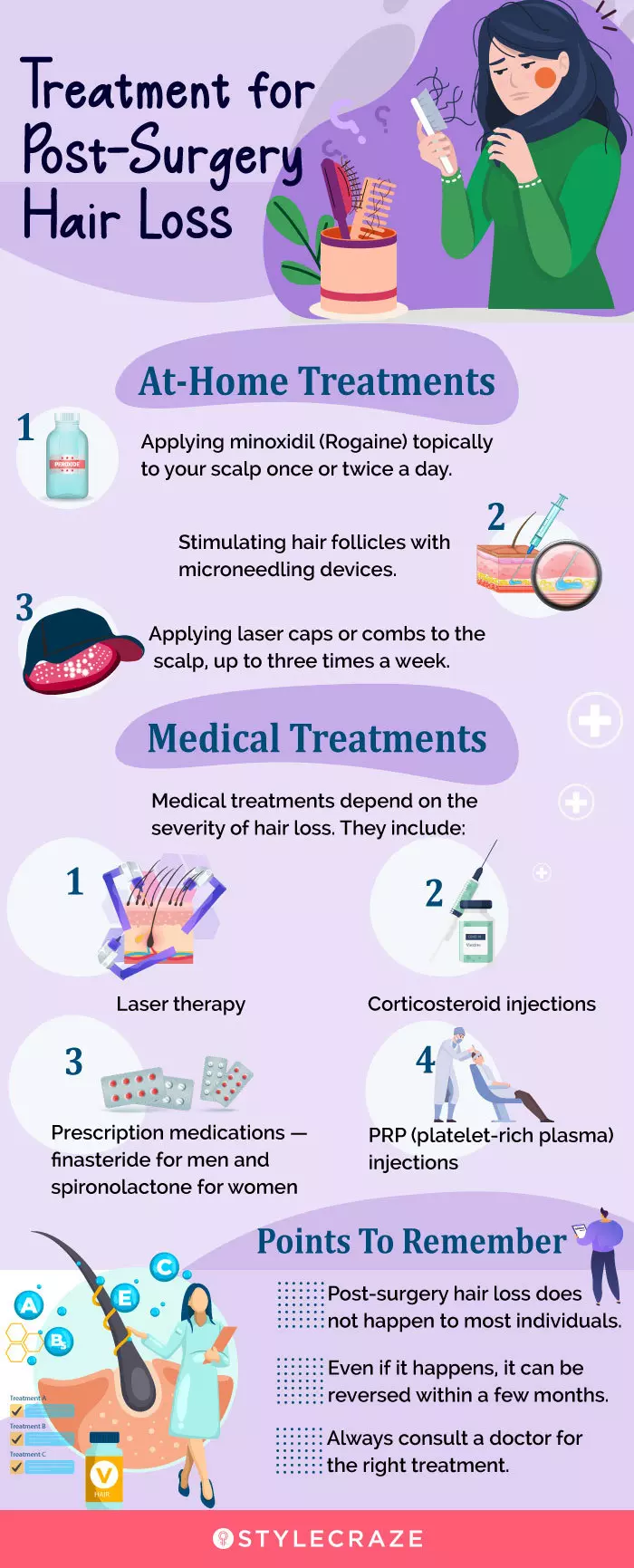
In A Nutshell
Hair loss after surgery is a common side effect. It may cause you to stress, but the good news is that the hair will regrow within a few months. The major reason behind losing hair after surgery is physiological stress. Stress and nutritional deficiencies induce inflammatory effects that inhibit hair growth. Prescription medicines and vitamin and nutrient supplements help reverse the situation. You can also make a few lifestyle changes to improve your hair health. Finally, consult a dermatologist if these do not show any results.
Frequently Asked Questions
What shampoo is good for telogen effluvium?
Shampoos that help exfoliate the scalp resulting in improved blood circulation, might be helpful in this condition. It would be best to avoid sulfuri A chemical substance used in cosmetics and shampoos to remove dirt and grease from the hair and may cause dryness and frizziness. -based and caffeine-based products.
Should I wash my hair less with telogen effluvium?
No, washing your hair less would lead to dirt and grime buildup leading to more hair loss.
Can you go bald from telogen effluvium?
While telogen effluvium might lead to hair thinning and hair loss, it doesn’t usually result in alopecia.
How can you treat hair loss after surgery?
A hair transplant treatment can help to fill in the bald patches by grafting hair from other parts of your body to give you a fuller appearance. You can also consider other hair restoration treatments like laser therapy or microneedling to treat hair loss (8), (9), (10).
References
Articles on StyleCraze are backed by verified information from peer-reviewed and academic research papers, reputed organizations, research institutions, and medical associations to ensure accuracy and relevance. Read our editorial policy to learn more.
- Telogen Effluvium: A Review
https://www.ncbi.nlm.nih.gov/pmc/articles/PMC4606321/ - Hair Loss After Laparoscopic Sleeve Gastrectomy
https://link.springer.com/article/10.1007/s11695-018-3433-3 - Burden of hair loss: stress and the underestimated psychosocial impact of telogen effluvium and androgenetic alopecia
https://pubmed.ncbi.nlm.nih.gov/15304082/ - The Role of Vitamins and Minerals in Hair Loss: A Review
https://www.ncbi.nlm.nih.gov/pmc/articles/PMC6380979/ - Minoxidil and its use in hair disorders: a review
https://www.ncbi.nlm.nih.gov/pmc/articles/PMC6691938/ - Diet and hair loss: effects of nutrient deficiency and supplement use
https://www.ncbi.nlm.nih.gov/pmc/articles/PMC5315033/ - Transient Hair Loss after Finger Replantation
https://www.ncbi.nlm.nih.gov/pmc/articles/PMC4297813/ - Follicular Unit Hair Transplantation 2010
https://www.researchgate.net/publication/267451081_Follicular_Unit_Hair_Transplantation_2010 - Low-Level Laser (Light) Therapy (LLLT) for Treatment of Hair Loss
https://www.ncbi.nlm.nih.gov/pmc/articles/PMC3944668/ - Repeated Microneedle Stimulation Induces Enhanced Hair Growth in a Murine Model
https://www.researchgate.net/publication/309740004_Repeated_Microneedle_Stimulation_Induces_Enhanced_Hair_Growth_in_a_Murine_Model
Read full bio of Kimberly Jenkins
Read full bio of Annie Jangam
Read full bio of Eshna Das
Read full bio of Swathi E






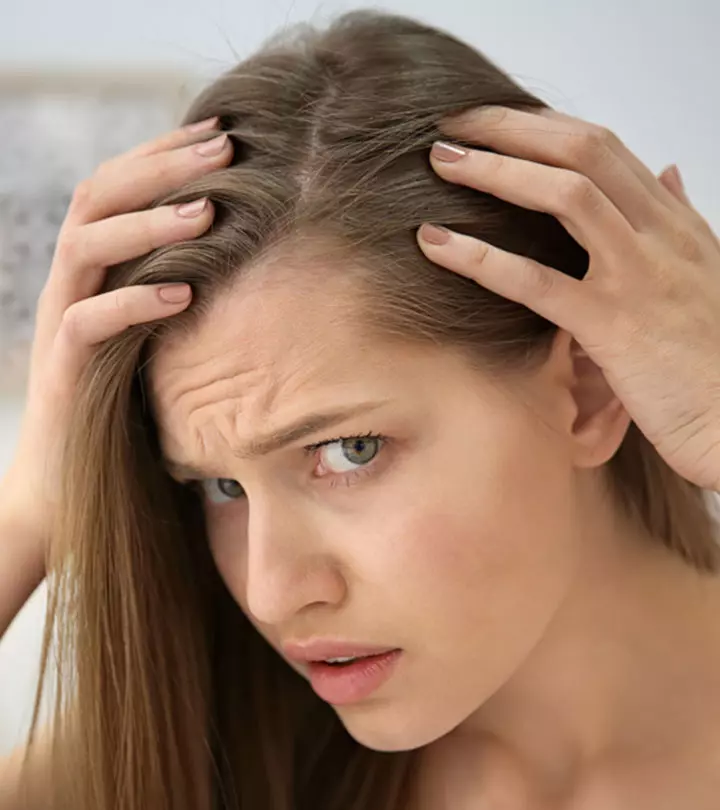



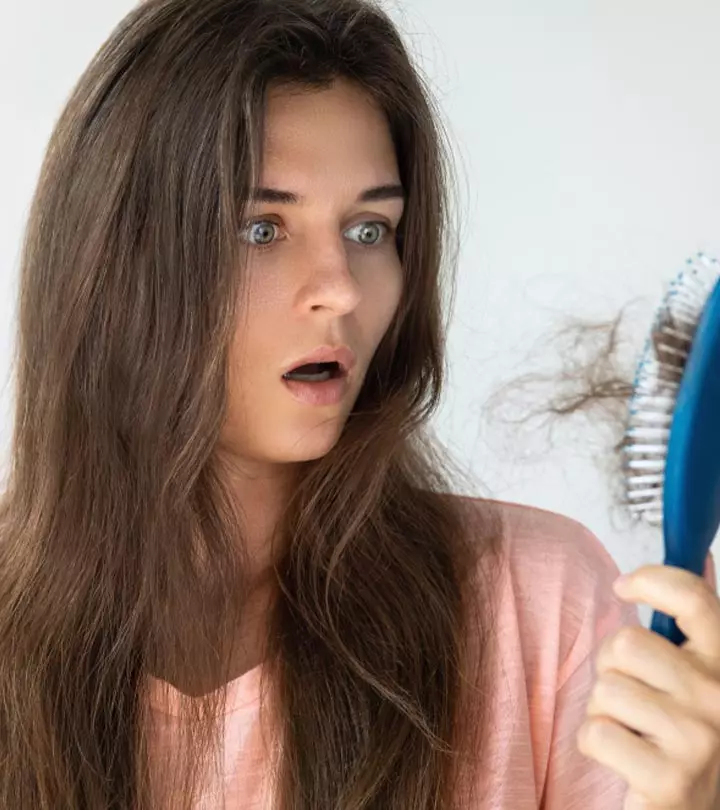



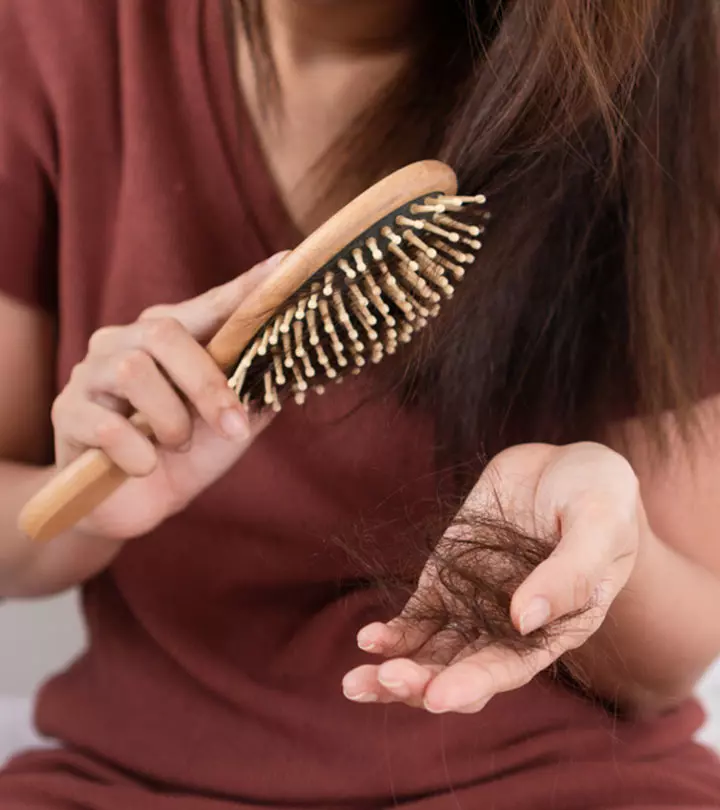












Community Experiences
Join the conversation and become a part of our empowering community! Share your stories, experiences, and insights to connect with other beauty, lifestyle, and health enthusiasts.